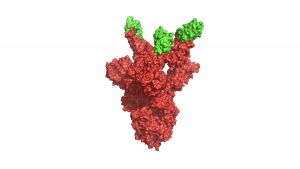Los ensayos in vivo se realizaron en el Instituto Nacional de Investigación y Tecnología Agraria y Alimentaria (INIA-CSIC) por Miguel Ángel Martín Acebes y Juan Carlos Saiz. Los investigadores demostraron el potencial terapéutico de cuatro de estos anticuerpos. La administración de una única dosis de estos anticuerpos protegió de la muerte causada por la covid-19 a entre el 85% y 100% de los animales infectados, que se recuperaron completamente en dos semanas.
Mediante ingeniería de proteínas se han humanizado las regiones VHH de estos anticuerpos, lo que permitirá su aplicación directa en ensayos clínicos. Estos anticuerpos podrían administrarse a pacientes infectados con SARS-CoV-2 que tuvieran riesgo de evolución a enfermedad severa (por ejemplo, pacientes inmunodeprimidos, que no hayan generado inmunidad tras vacunación, o no vacunados) y así paliar las consecuencias más graves de la covid-19, incluida la muerte.
Los dromedarios, clave en el estudio
Los grupos de investigación del CNB-CSIC han desarrollado estos anticuerpos partiendo de segmentos generados por inmunización de dromedarios en colaboración con Juan Alberto Corbera, de la Universidad de Las Palmas de Gran Canaria. Posteriormente fueron clonados en bacterias E. coli en el CNB-CSIC. “Los camélidos (dromedarios, llamas, alpacas, etc.) producen un tipo de anticuerpos capaces de reconocer al antígeno con una sola cadena de proteína, en lugar de dos en el resto de especies animales. Así, la zona de reconocimiento del antígeno en estos anticuerpos es de menor tamaño, y pueden alcanzar regiones en la superficie de virus y bacterias inaccesibles de otro modo”, explica Luis Ángel Fernández, que dirige el grupo de ingeniería bacteriana del CNB.
“En el laboratorio aislamos la zona de unión de estos anticuerpos, fragmentos de pequeño tamaño conocidos como nanoanticuerpos con gran capacidad de bloquear a virus y bacterias. Al tener secuencias muy similares a las de los anticuerpos humanos, pueden utilizarse directamente en terapia sin generar rechazo”, señala Fernández. Además, tienen algunas propiedades muy útiles, como su mayor estabilidad y resistencia a condiciones extremas.
Referencia:
Casasnovas J.M., Margolles Y., Noriega M.A., Guzmán M., Arranz R., Melero R., Casanova M., Corbera J.A., Jiménez de Oya N., Gastaminza P., Garaigorta U., Saiz J.C., Martín-Acebes M.A., and L.A. Fernández (2022). Nanobodies protecting from lethal SARS-CoV-2 infection target receptor binding epitopes preserved in virus variants other than omicron. Frontiers in Immunology. DOI: https://doi.org/10.3389/fimmu.2022.863831
CNB-CSIC y CSIC Comunicación






